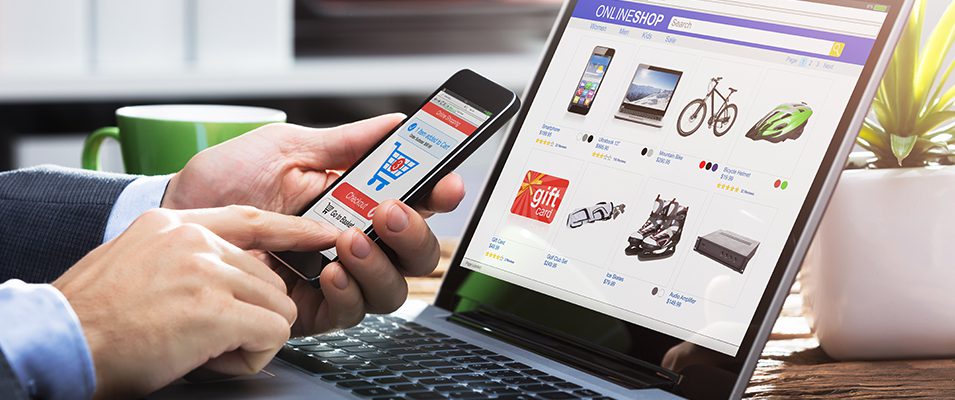
02 Mar 10 Tips for Safe Online Shopping
Online shopping has revolutionized purchasing goods and services, offering unprecedented convenience. However, it has introduced countless potential risks for merchants and, especially, consumers. So, embracing the online landscape with caution is of the utmost importance. At Sunwest Bank, we prioritize your security and are committed to helping you navigate online shopping safely.
These comprehensive tips for online shopping dive deep into ten essential considerations for secure online shopping, all backed by Sunwest’s commitment to your financial well-being. We’ll empower you to identify trustworthy vendors, safeguard your personal information, and make informed decisions that protect your hard-earned money.
1. Trust Your Instincts
Your instincts are your first line of defense against scams when shopping online. If something feels off about a transaction, it’s important to pay attention. The internet is riddled with deals that seem too good to be true, and high-pressure tactics or unusual payment requests are red flags you must acknowledge. Remember, there is a reason your gut is telling you something feels off, so listen! You don’t get those feelings when you shop on a known, trusted site, and there is a reason for that, too. And if something unusual does happen on a familiar site that you know is not typical for that online store, move forward cautiously to avoid potential malware from a hack.
Recognizing Red Flags
Common red flags include sellers who insist on immediate payment, offer deals that are significantly lower than market value, or request payment methods that lack buyer protection. These tactics are designed to pressure you into making a hasty decision. Always take your time to evaluate the offer and the seller’s credibility before continuing your online shopping spree.
2. Ensure a Secure Internet Connection
Always shop from your home computer or a secure, private connection. Public Wi-Fi networks at cafes or libraries are vulnerable to cyber-attacks, making it easier for hackers to intercept your data. Before you enter any personal or banking information for online purchases, ensure that your internet connection is secure.
Identifying Secure Websites
Look for indicators that the website is secure, such as a green address bar and URL that begins with “https”. These symbols indicate that the site employs encryption to protect your data. However, remember that even these indicators can be forged. For additional security, consider using a virtual private network (VPN) to encrypt your internet connection.
Benefits of Using a VPN
A VPN provides an extra layer of protection by masking your IP address and encrypting your data, making it more difficult for hackers to access your information. It not only secures your connection but also protects your privacy and prevents third parties from tracking your online activities and accessing your private information. By using a VPN, you can more safely shop online, knowing that your data is secure.
3. Verify the Seller’s Credibility
Knowing who you’re dealing with is crucial. Online shopping allows you to purchase from sellers worldwide, but not all sellers are trustworthy. Confirm the online seller’s physical address and phone number. Thoroughly read their return and refund policies, including shipping and handling charges. Some sellers may not accept returns, or they might impose restocking fees. As mentioned earlier, you have trusted online stores that you know are safe, so whenever you are on a new site, take a few extra minutes to ensure your security.
Researching the Seller
If information about the unfamiliar site isn’t readily available, contact the seller directly. Additionally, take advantage of tracking options to monitor your purchase. Research the seller by reading customer reviews and checking their ratings on trusted platforms. Look for consistent positive feedback and pay attention to any recurring complaints.
Utilizing Third-Party Resources
Utilizing third-party resources such as the Better Business Bureau (BBB) to verify the seller’s credibility is one of the best steps you can take. The BBB provides ratings and reviews of businesses, helping you make informed decisions about where to shop. Additionally, consider searching for any news articles or reports about the seller to ensure they have a good reputation.
4. Understand What You’re Buying
Analyze the product descriptions carefully. Terms like “refurbished,” “vintage,” or “close-out” often indicate items that aren’t brand new, which is an obvious red flag if you are not shopping for used items. Be cautious of name-brand products offered at significantly low prices, as they could be counterfeit. Remember, if an offer sounds too good to be true, it probably is, and it’s always better to wait for a trustworthy purchase over getting your debit card information stolen.
Analyzing Product Photos and Reviews
Look at product photos closely to identify any signs of wear or damage or if the photos look like stock images grabbed from somewhere else on the internet. You can always do an image search for any product image to see if the same picture is being used on an unrelated, sketchy site.
Read customer reviews to gain insights into the product’s quality and the seller’s reliability. Reviews can provide valuable information about the item’s condition, functionality, and overall satisfaction from previous buyers.
Understanding Return Policies
Understanding the return policy is essential before making a purchase. Some items may not be eligible for returns, or there may be strict conditions for returning a product, but strict or non-existent return policies may not always indicate an untrustworthy seller. Still, you must be comfortable with the seller’s return policy before proceeding with your online purchases.
5. Know the Total Cost
Before making a purchase, compare prices both online and offline. Use websites that offer price comparisons to ensure you’re getting the best deal. Consider all costs, including shipping, handling, and taxes. This comprehensive approach will help you make informed purchasing decisions that won’t hurt you in the future.
Hidden Costs and Fees
Be aware of hidden costs and fees that may not be immediately apparent. Some sellers may charge high shipping fees or additional taxes that can significantly increase the total cost of your purchase. Read the fine print and understand all costs associated with your purchase before completing the transaction.
Using Coupons and Discounts
Take advantage of coupons and discount codes to save money on your purchases. Many online retailers offer promotional codes that can provide significant savings. Search for these codes before completing your purchase to ensure you are getting the best possible deal and improve your online shopping experience.
6. Use the Safest Payment Methods
Benefits of Using Credit Cards
Credit cards are the safest way to pay online, providing protection under the Fair Credit Billing Act. You can dispute charges with credit card companies and withhold payment if there are issues. Services like PayPal offer additional layers of security by preventing sellers from accessing your sensitive financial details. Avoid sending cash or money transfers, as they lack the protections provided by a credit or debit card and reputable third-party payment services.
Utilizing Payment Services
Payment services like PayPal or Apple Pay can also provide an extra layer of security for your transactions. These services act as intermediaries, protecting your financial information and offering buyer protection programs. By using these services, you can reduce the risk of fraud and ensure a secure transaction process.
Setting Up Alerts
Set up alerts for your cards and bank accounts to monitor unauthorized transactions. Many financial institutions offer real-time alerts that notify you of any suspicious activity. By staying vigilant and monitoring your accounts, you can quickly identify and address any potential issues.
7. Keep Detailed Records
Maintain thorough records of your online transactions. Print and date copies of the product description, receipt, terms and conditions, warranties, and any correspondence with the seller. Keeping meticulous records helps protect you in case of disputes or scams.
Monitoring Your Accounts
Regularly review and store, your credit card statements for unauthorized charges. Promptly catching and reporting any suspicious activity to your financial institution will help minimize the impact of fraud and likely lead to easier resolution. By staying proactive, you can protect your finances and maintain peace of mind when shopping online.
8. Protect Your Personal Information
Never share your financial information, such as your credit card, checking account, or Social Security number, via email. Legitimate businesses and banks, including Sunwest Bank, will almost never request this information, especially through email.
Creating Strong Passwords
Protect your personal and credit card information by creating a strong password that is difficult to guess, and using a password manager will help ensure your protection. When creating a password, use a random combination of letters, numbers, and special characters to enhance the security of your accounts; a typical password manager will have a password generator that will do this for you and automatically store the credentials in a secure place. Regularly update your passwords and avoid using the same password for multiple accounts.
Utilizing Two-Factor Authentication
Enable two-factor authentication (2FA) for your online accounts whenever possible. 2FA adds an extra layer of security by requiring a second form of verification, such as a text message or email code, in addition to your password. This additional step makes it more difficult for hackers to access your accounts since only you can access texts or emails that go to your devices.
9. Inspect Your Purchase
Upon receiving your purchase, inspect it right after opening. If there are any issues, contact the seller immediately and be persistent if they are not responding promptly. Many untrustworthy sellers purposely avoid customer interaction as they know they are being unethical, but persistence can be key in finding a resolution. Following tip #7 and documenting all problems and correspondence will assist in this process.
Escalating Disputes
If the seller is unresponsive or unwilling to resolve the issue, consider escalating the dispute. Many online marketplaces, such as eBay or Amazon, offer buyer protection programs that can help mediate disputes and provide refunds. Utilize these resources to ensure a fair resolution.
10. Be Aware of Online Shopping Scams
Online shopping is convenient but has risks. Fraudsters target the digital marketplace, especially those in demographics that are not entirely internet savvy, so it’s vital to deal with reputable companies or individuals. Research unfamiliar sellers before making a purchase. Look for customer reviews and ratings, and consult the Better Business Bureau if necessary.
Phishing attempts are common online scams where fraudsters try to steal your personal information by pretending to be legitimate businesses. Be cautious of emails or messages asking for your personal or financial information. Verify the sender’s identity before clicking links or providing any information.
Remember, fake websites are designed to look like legitimate online stores but are actually set up to steal your information. Verify the web address and look for any signs of inconsistency or poor design. Use search engines to check for reviews or reports about the website before making a purchase.
How to Report Online Shopping Fraud
If you have problems during a transaction, try to work them out directly with the seller, buyer, or site operator. If that doesn’t work, file a complaint with:
- The Federal Trade Commission
- Your state Attorney General
- Your county or state consumer protection agency. Look under “Where to File a Complaint.”
- The Better Business Bureau
Powered by www.InfoSightInc.com




